School of Skills
Watch our video to learn more about a School of Skills.
What are Schools of Skills?
A School of Skills offer a viable alternative for pupils who are unable to cope or develop in mainstream schools or classrooms.
A School of Skills assist learners with special needs who can't cope or achieve in the National Curriculum Statement (NCS). These schools fulfill an important role within the education system.
Many of the learners that benefit from these schools are completely disconnected from other learners and educators. The focus of these schools is to reconnect learners with fellow learners, to make them feel valued and develop a sense of belonging. This alternative to mainstream education offer learners who may never be able to write a matric examination, a chance to get skills for a better life.
Pupils are taught a skill that will enable them to enter the labour market. Pupils receive academic as well as technical training at a School of Skills.
Technical training is given in different subject areas depending on the learner’s ability and interest. This training helps the learner to either continue with his/her technical training or enter the world of work, after school.
Who can attend?
Leaners will benefit to enrol in a School of Skills if:
- The learner is 14 or 15 years old and has received extensive, documented support in the mainstream school.
- They experience moderate cognitive barriers to learning which causes very poor scholastic progress. The learner’s lack of progress may be so severe that he/she will only be able to cope on a Foundation Phase level.
- They aren't severely or profoundly intellectually disabled.
- They don’t experience serious behavioural learning barriers.
- They have a short attention span.
- They have a very poor reading ability.
- They attend school regularly, but don’t reap the benefits of the curriculum in spite of support efforts.
- They've spent more time in both Foundation and Intermediate Phase, without showing significant improvement.
- They’re usually functioning 2 years and more below his/her age cohort and is seriously at risk of leaving school early, without attaining skills to enter the world of work successfully.
Learners will benefit from a vocational/practical approach to the curriculum and develop skills to be able to enter the job market.

Pupils who attend a School of Skills can choose the following subjects (depending on which school they attend):
- Ancillary Health
- Care Automotive Repair and Maintenance
- Art and Crafts
- Automotive Spray Painting
- Hairdressing Beauty and Nail Technology
- Automotive
- Body Repair Maintenance
- Bricklaying and Plastering
- Housekeeping
- Basic Welding and Metal Work
- Needlework and Clothing
- Mixed Farming
- Basic Sheet Metal Work
- Hospitality Studies
- Upholstery
- Early Childhood Development
- Woodworking
- Office Administration
If you would like to find out more about a School of Skills and how they can cater to your child, find the closest one to you and give them a call.


